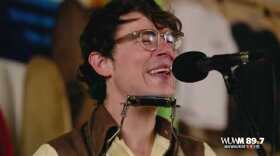News of the discovery of gravitational waves dominated the news a couple of weeks ago, and UWM scientists were among those who played a large role in that discovery.
Our astronomy contributor and the director of the Manfred Olson Planetarium, Jean Creighton, was not only excited about the discovery for its scientific importance, but also personal significance.
"My husband (UWM Physics professor Jolien Creighton) came home and said, 'Well I have a choice in front of me...I could either continue doing very theoretical thermal dynamics of black holes, or I could get involved in this project called LIGO...' He explained a bit of the project and I said, 'Hmm, that smells like a Nobel prize to me," Jean Creighton says.
Ultimately, the discovery of gravitational waves - ripples in spacetime created by catastrophic events - confirmed Albert Einstein's prediction made a century ago. Thanks to modern technology and researchers around the world, our understanding of modern gravity has exponentially increased.
"Two black holes that are about thirty solar masses moving at about half the speed of light...merge together in about a quarter of a second. And in that quarter of a second the power from that event outshone every other start in every other galaxy combined," explains Creighton. "This was a theoretical and a technological major, major achievement."







